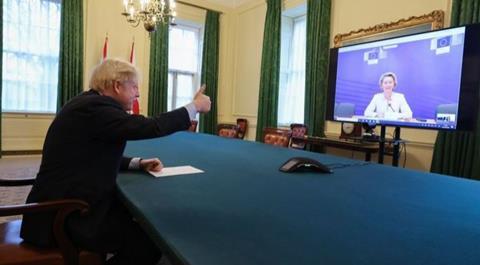Deal brings certainty over import of building products but architects fear being cut out of EU work
Construction industry leaders have welcomed the post-Brexit trade deal with the EU agreed on Christmas Eve, which will allow the continued importation of vital building products from the EU without additional tariffs.
However, architects have raised concerns the deal will not be enough to ensure construction professionals can work on EU projects, an outcome which could be a significant blow to the profession.

The BBC has reported that ambassadors from the 27 member states of the EU will today unanimously sign a declaration of support for the post-Brexit trade deal sealed by prime minister Boris Johnson (pictured) on Christmas Eve, allowing the deal to take effect provisionally in January.
MPs are expected to vote on the deal tomorrow, bringing it into UK law before the end of the week.
The Christmas Eve agreement came just over a week before the UK officially leaves the bloc when its transition period out of the EU ends at midnight on 31 December.
The head of policy at the National Federation of Builders and chair of the Construction Leadership Council’s Brexit working group hailed the move as “a good day for British construction”.
James Butcher added: “The UK and EU’s announcement of a trade deal will come as welcome relief, not just to the construction industry but to the global economy.
“The agreements reached will enable construction companies to continue to reliably forecast the cost and availability of products and materials imported from the EU or comprising components made in the EU. The mutual co-operation in respect of reducing technical trade barriers and co-operation at the border will also undoubtedly help to avoid some of the risks of delay and disruption.
“What this means is that in January we will not see the inflationary shock of tariff and quota introductions or the expected currency depreciation associated with a no-deal. This deal delivers certainty at a time when it is needed most.”
In addition the chief executive of the Builders Mercheants Federation, John Newcomb, said the deal “should avoid unnecessary tariffs on building products and materials moving between the EU and the UK and the price rises that would inevitably follow”.
He added: “We now have the assurance of the continued free flow of materials needed to fulfil the Government’s promise to build back better, improve the energy efficiency of our homes and create the many thousands of jobs required to do so.
“However, we remain concerned over the capacity problems at UK container ports, which in recent weeks have demonstrated how quickly shortages and consequential price increases can occur. We are continuing to press for action to resolve these issues as soon as possible, so the construction industry’s new year return to work is not slowed by the lack of key products.”
But the chief executive of RIBA Alan Vallance said: “While this deal provides us with some certainty around the future relationship between the UK and EU, hesitation and vagueness around trade in services remains a serious concern for our profession. Architects in both the UK and EU were clear about the need for a continued agreement on recognition of professional qualifications, and it is deeply worrying that this does not seem to be part of the deal as it stands.”
He added: “It’s our hope, however, that this deal will keep the costs of importing construction materials down and – current border issues aside – at least provide some confidence over trading in goods.”
The chair of housing architect HTA, former Riba president Ben Derbyshire, said the deal did not reverse the “tragic loss” to the UK’s prosperity, trade and culture from Brexit. He said: “We still do not know whether there will be mutual recognition of qualifications for architects. Architecture prospers on the international exchange of culture and ideas. We must have the freedom of access to European work if British Architecture is to retain its pre-eminent position.
“I have an overwhelming sense of sadness and regret at the damage we have done to European political, economic and cultural unity. We must hope for the best, but if my sense of profound uncertainty, bordering dread, is in any way reflected by the worlds influential decision-makers, I fear we are in for a very difficult time.”
The government has said the deal with the EU was the first free trade agreement based on zero tariffs and zero quotas that has ever been achieved, covering trade worth £668bn in 2019.
It said in a statement, released on Christmas Eve, that: “We have delivered this great deal for the entire United Kingdom in record time, and under extremely challenging conditions, which protects the integrity of our internal market and Northern Ireland’s place within it.”
The deal needs to be made law by both the European and UK parliaments.
The European parliament is thought likely to formally sign it off in January, though it will take effect provisionally after the support of the ambassadors of members states.










No comments yet